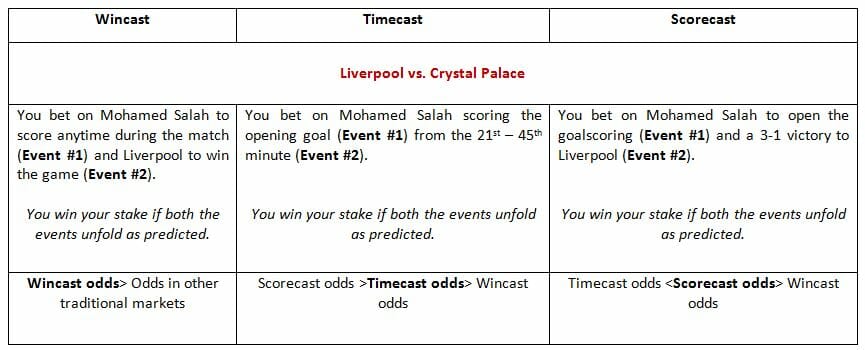As sports betting continues to evolve and expand, the relevance of ‘cast’ bets increases, particularly because of the lucrative odds they have on offer for punters. In this article, we explain what Timecast betting is, along with the advantages it offers and more.
What is a Timecast Bet?
Akin to the Half time/Full time market, a Timecast bet is a part of the double bet category. With Timecast betting, you have to wager on two distinct events in a football game – a potential goalscorer and the time of that goal. While the most popular version that bookmakers offer is the First Goalscorer Timecast, others like the Last or Anytime Goalscorer Timecast have been gaining ground as well.
With respect to a Timecast bet, you can wager subject to the stipulated duration of the match, i.e. 90 minutes + injury time. Extra time doesn’t count. The advantage of this type of a bet is that it does away with the need to predict the final result of the match (applicable to Wincast) or the correct score (applicable to Scorecast) for that matter.
Remember that you can pull through a Timecast wager only if you predict both the events correctly, much like what happens in Wincast and Scorecast betting. Should you only win one part of the wager, you lose your stake. For instance, if you correctly guess the potential goalscorer but fail to predict the timing of that goal, you lose your bet. This is what makes this market a little unpredictable, as both elements of the bet need to be successful for you to win.
However, the upside is that you get access to higher odds compared to other standard markets – the Both Teams to Score market, for example.
Note that a Timecast bet is usually split into three parts: 1-20th minute, 21st – 45th minute, and 46th minute and beyond. However, some bookmakers split the bet into two: 1st – 30th minute, and 31st minute and beyond.
Example of Timecast Betting
Let us take the example of a match where Watford is taking on Leicester City. You put your Timecast wager on The Foxes’ striker Jamie Vardy to score 1st within the 21st – 45th minute of the match. The first part of the bet can be the first, last or Anytime Goalscorer, depending on your selection. That being said, First Goalscorer Timecast is commonly preferred over the others.
Remember that you win your stake only if Jamie Vardy opens proceedings with a goal in the designated window (i.e. 21st to 45th minute). Should either part of the bet not come through, you would lose your stake. Note that the final result of the game is irrelevant to the bet here.

In case the elected player sits out for the match, your bet will be invalidated.
Let’s take a look at the most common Timecast market – the First Goalscorer Timecast.
First Goalscorer Timecast
This wager requires you to back a potential goalscorer who you think will net the first goal of the match as well as the expected time window of that goal. For instance, for a Wolves vs. Bournemouth Premier League face-off, you back home striker Diogo Jota to score 1st between the 21st to 45th minute.

At the time of writing this article, William Hill is offering Timecast odds of 11/1 on Burnley to score 1st and the goal to come after the 31st minute of the match.
Anytime Goalscorer Timecast
Here, you back a potential goalscorer to net a goal within a specific time period in the match. However, the difference between this wager and the First Goalscorer Timecast is that here, the elected player doesn’t have to score the first goal in the game. Nevertheless, you still have to get the second part of the bet right, i.e. the accurate time of the goal coming in.
Advantages of Timecast Betting
Timecast bets are gradually (but certainly) gaining relevance among punters. That’s because while it may be a tricky market, the upsides to betting on it are numerous. We've listed some of these advantages below:
Lucrative odds
A Timecast bet may not be the easiest to win, considering you have to predict the time of a goal along with the potential goalscorer. However, the higher odds on offer make up for the challenges it presents.
To give you an example of these high odds, bet365 is currently offering 71/1 on Everton centre-back Yerry Mina scoring the first goal of the match against Liverpool between the 21st and 45th minute (odds correct at the time of writing).
Easier Compared to a Scorecast bet
In Scorecast betting, you have to back a potential goalscorer and the correct score of the game – something that is easier said than done. But a Timecast bet only requires you to guess the timing of a goal with the player you think will score first. It takes the correct score and the full time result out of the equation, something that makes it a relatively simple wager.
Also, in case of a slow-burning fixture, you might back your favourite player to join the party only in the second half. Wagering in this market can prove to be a handsome proposition in such a scenario.
Greater flexibility
Timecast bets can span from a few minutes to an entire half, depending on the bookmaker you choose to place your faith in. This way, you have more room to play with. For instance, a Timecast bet from William Hill is split into two: up to and including the 30th minute, and 31st minute and beyond. On the other hand, bet365 provides three windows for you to wager: 1st – 20th minute; 21st – 45th minute; and 46th minute and beyond.
Timecast Betting Strategy and Tips
How do you decide which goalscorer to back? How do you put your finger on the time of a goal? While Timecast betting terms has the potential to register handsome winnings, there are a few important tips that can serve you well.
Keep the following in mind:
Current form of the elected player
This is a no-brainer. Considering Timecast betting does away with the need to back the correct score or final result of a match, the odds are stacked on the potential goalscorer. Make sure your man has been in good form heading into the contest so that there’s a good chance of him scoring.
Current form of the two teams
Think about a situation where Liverpool is squaring off against West Ham United at the Anfield stadium. You find generous Timecast odds on West Ham forward Jarrod Bowen netting the first goal of the match up to and including the 30th minute.
Do you go ahead with the bet? This is something you should decide only after considering the form of both the outfits. If Liverpool has been enjoying an excellent home run while conceding less than one goal per match on an average, you might want to reserve your bet for better selections with a higher probability.
Time of the opening goal in matches involving the two sides
Check for any statistics relating to this particular element, as they could give you ballpark with which to zero in on a good selection. For example, you back Wilfried Zaha to score the opener against Liverpool between the 1st and 20th minute. What are the odds of your Timecast bet coming through? A look back at the recent contests between the two teams can clue you in. Additionally, factor in the player who has been opening the party early in some of the recent encounters.
Winning at Timecast Betting: Explained
A Timecast bet is a double bet, meaning that both parts of the wager need to come through if you want to win on your stake. For instance, consider a match where Manchester City is hosting Burnley. You back Raheem Sterling to score first within the first 20 minutes of the match.
You win only if both the events play out as you have predicted: Sterling nets the first goal of the match, and does it within the opening 20 minutes. Note that it doesn’t matter which side wins the match or what the correct score is.
Visit bet365 to find odds of 8/1 on Sterling opening the goalscoring within the first 20 minutes in Manchester City’s home fixture against Burnley (odds mentioned correct at the time of writing).
Losing at Timecast Betting: Explained
With Timecast betting, you lose your stake if any one of the events don’t unfold the way you predicted. For instance, consider a game where Brighton is taking on Arsenal at home. You back Arsenal forward Alexandre Lacazette to score the opening goal up to and including the 30th minute. However, Brighton puts in a spirited show and sees out a goalless first half.

However, Lacazette kicks off the second half with a goal. But as far as your bet is concerned, you're set to lose your stake. That’s because while Lacazette scored, he didn’t do it within the designated window of the first 30 minutes.
Timecast vs. Wincast vs. Scorecast

Other Common Betting Terms
ThePuntersPage Final Say
Timecast betting can reap sizeable returns if you have your bases covered. We advise that you put in the necessary legwork and shop around for the best odds. While this may sound obvious, it is all the more applicable to cast bets. That’s because Timecast odds are likely to vary by a larger margin across bookmakers compared with more conventional markets.
Another strategy to hedge against losses is to cover your bets. The downside of a Timecast bet is that the probability of the wager coming through is less relative to the first goalscorer and time of the first goal individually. Therefore, punters sometimes like to place three separate bets – one on the First Goalscorer, one on the Time of First Goal, and one Timecast bet. This way, you will be able to register wins even if any one of the bets comes through.
Finally, don’t forget to read up reviews of leading bookmakers to get a comprehensive idea of what they can offer, which automatically translates to a more seamless betting experience.
Timecast Betting FAQs
Timecast betting belongs to the double bet category, where both the events will have to unfold accurately for you to win your stake. Timecast bets require you to back any player you think will score first (or anytime) in the game coupled with the precise time window for that goal.
As mentioned, both the outcomes need to turn up for you to win the wager. For example, if you back Marcus Rashford to score the first goal of the match after the 46th minute, you win the bet only if it satisfies both conditions – Rashford scoring the first goal of the game only after the 46th minute.
You should consider a few strategies before placing a Timecast bet. Determine the form of the player whom you want to back, the current form of the two sides, and the time at which the opening goal has been coming in the recent encounters involving the two teams.
Timecast bets are an almost intermediate type of a Wincast and Scorecast. The odds are usually higher when compared to Wincast and lower compared to Scorecast.
No. Betting is limited to the stipulated 90 minutes of the match + injury time.













